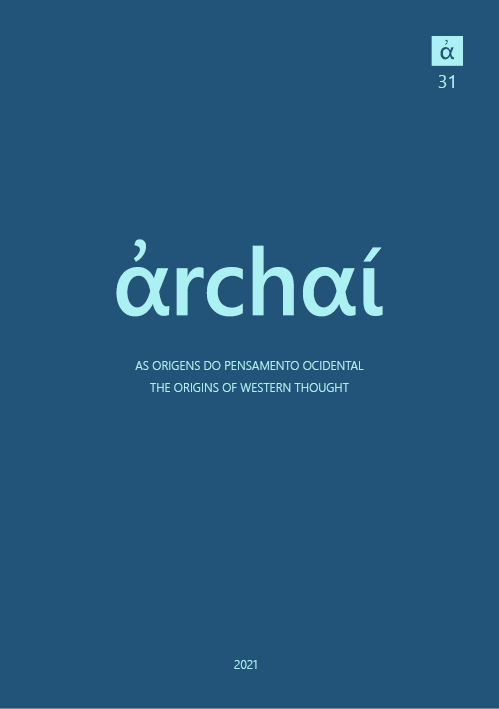“Muchos Ciros”: reconsideraciones sobre la Ciropedia de Jenofonte y el humanismo renacentista inglés
DOI:
https://doi.org/10.14195/1984-249X_31_12Palavras-chave:
Ciropedia, Jenofonte, humanismo, Renacimiento inglés, espejo de príncipesResumo
La historia de la recepción de un texto suele estar en conflicto con sus orígenes. Colin Burrow nota la ironía de que, a pesar del gran apoyo de aquellos en el poder, la Eneidade Virgilio es tomada y traducida por los desfavorecidos durante el Renacimiento. Lo mismo es en parte cierto para la Ciropediade Jenofonte. Este artículo examina el lugar de la Ciropediadentro de la tradición humanista inglesa, centrándose en ciertas traducciones inglesas del texto y en sus interpretaciones dentro de la tradición speculum principis(espejo de príncipes). Esto culmina en el momento en el que el monarca reinante, el Rey Jacobo I de Inglaterra, encuentra reflejado en Ciropediaun modelo irresistible de realeza imperialDownloads
Referências
BARKER, W. (trad.) (1552). The bookes of Xenophon contayning the discipline, schole, and education of Cyrus the noble kyng of Persie. Londres, Reynolde Wolfe.
BARKER, W. (trad.) (1567). The VIII. bookes ofXenophon, containinge the institutio[n], schole, and edwation of Cyrus, the noble Kynge of Persye. Londres, Reynolde Wolfe.
BURROW, C. (2000). “Virgil in English Translation” en MARTINDALE, C. (ed.) The Cambridge Companion to Virgil. Cambridge, Cambridge University Press.
CLELAND, J (1607). Heropaideia. Londres, Joseph Barnes.
DIGBY, F. ; NORRIS, J. (trads.) (1685). Kyrou Paideia: Or, the Institution and Life of Cyrus the Great. Written by That Famous Philosopher and General, Xenophon of Athens. Londres, para Matthew Gilliflower y James Norris.
GOLDING, A. (trad.) (1564). Thabridgment of the histories of Trogus Pompeius,collected and wrytten in the Laten tonge, by the famous historiographer Iustine. Londres, Thomas Marshe.
HAMILTON, A.C. (ed.) (1995). The Faerie Queene. Londres y Nueva York, Longman.
HOLLAND, P. (trad.) (1632). Cyrupaedia. Londres, J[ohn] L[egat].
HOULBROOKE, R. (ed.) (2006). 'The Philosophy of Imperial Kingship and the Interpretation of James VI and I' en James VI and I: Ideas, Authority, and Government. Aldershot, Ashgate.
JARDINE, L. (ed.) (1997). Erasmus: The Education of a Christian Prince. Cambridge, Cambridge University Press.
MACHIAVELLI, N. (1995). The Prince. Harmondsworth, Penguin.
RICH, B. (trad.) (1584). The Famous Hystory of Herodotus. Londres, Thomas Marshe.
SHEPHERD, G. (ed) (1989). An Apology for Poetry. Manchester, Manchester University Press.
TATUM, J (1989). Xenophon's Imperial Fiction: On 'The Education of Cyrus'. Princeton, Princeton University Press.
Downloads
Publicado
Como Citar
Edição
Seção
Licença
Copyright (c) 2021 Jane Grogan

Este trabalho está licenciado sob uma licença Creative Commons Attribution 4.0 International License.
Dado o acesso público desta revista, os textos são de uso gratuito, com obrigatoriedade de reconhecimento da autoria original e da publicação inicial nesta revista. O conteúdo das publicações é de total e exclusiva responsabilidade dos autores.
1. Os autores autorizam a publicação do artigo na revista.
2. Os autores garantem que a contribuição é original, responsabilizando-se inteiramente por seu conteúdo em caso de eventual impugnação por parte de terceiros.
3. Os autores garantem que a contribuição que não está em processo de avaliação em outras revistas.
4. Os autores mantêm os direitos autorais e concedem à revista o direito de primeira publicação, sendo o trabalho licenciado sob a Creative Commons Attribution License-BY.
5. Os autores têm permissão e são estimulados a publicar e distribuir seu trabalho on-line após a publicação na revista.
6. Os autores dos trabalhos aprovados autorizam a revista a, após a publicação, ceder seu conteúdo para reprodução em indexadores de conteúdo, bibliotecas virtuais e similares.
7. É reservado aos editores o direito de proceder ajustes textuais e de adequação do artigo às normas da publicação.



